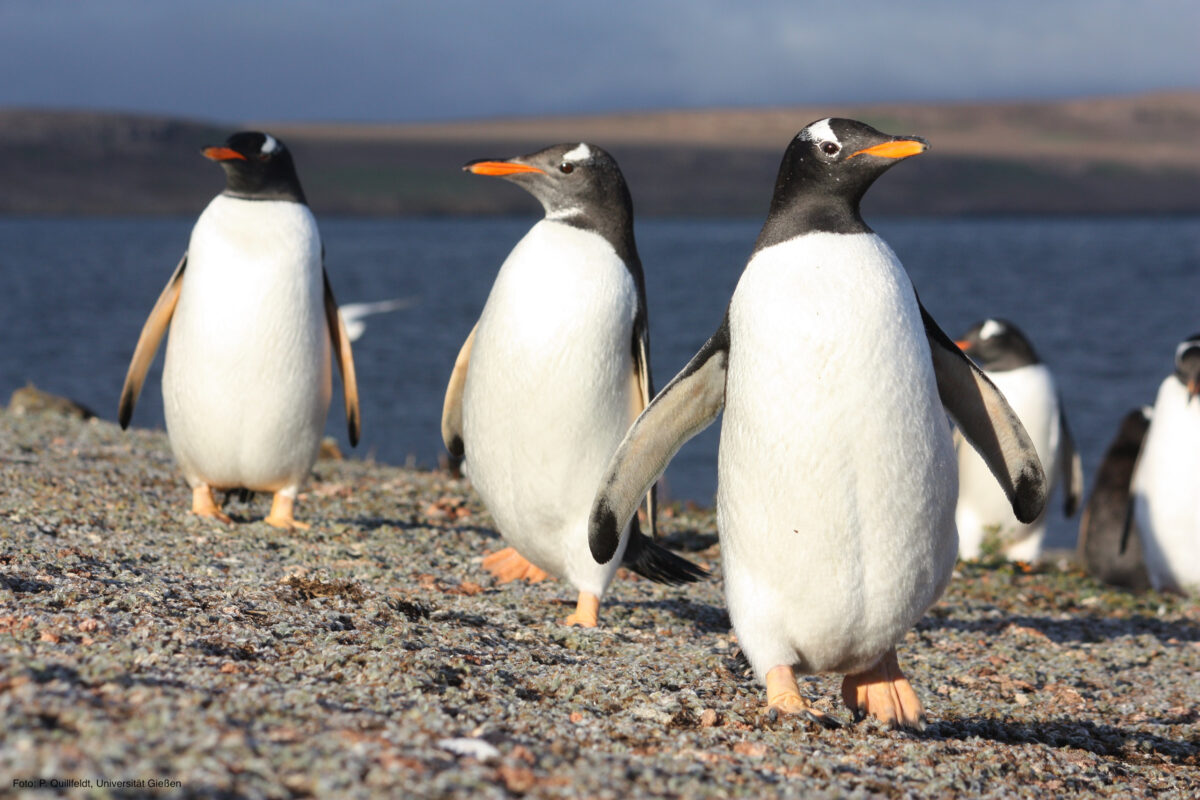Research in the Working Group “Behavioural Ecology and Ecophysiology”, Justus-Liebig-University Giessen
Do polar seabirds manage to adapt to environmental changes? Seabirds react to environmental stresses such as climate change and pollutant inputs in the sea. They are therefore important indicators of environmental change. The polar regions are particularly affected by climate change, and pollution levels are also increasing in these remote locations. Our research focuses on the evolution, behaviour and adaptations of polar seabirds to environmental changes. Our goal is to gain an ever better understanding of their behaviour at the individual and population level and thus optimise the potential use of seabirds in environmental monitoring. To this end, we are investigating the different adaptations of the individual species in the context of current and evolutionary environmental changes.
Research questions
- How flexibly do seabirds respond to environmental changes through adaptations in movement patterns and in diet, and what effects does this have on their breeding success?
- How are seabirds distributed in the polar oceans, and how does this affect their exposure to environmental stressors?
- How have past environmental changes influenced seabird evolution and speciation?
- What role do birds play as part of polar food webs, and how are they affected by changes in these?
Methods
- Monitoring of breeding success and diet, including analysis of stable isotopes and molecular diet determination
- Tracking of movements during the breeding season and migration
- Molecular analyses of individuals (sex, genetic relationships) and populations
- Behavioural analyses from acoustic, video and logger data
- GIS, multivariate statistics, habitat modelling
Responsible persons
Prof. Dr. Petra Quillfeldt, Justus Liebig University Gießen
Dr. Juan F. Masello, Justus Liebig University Gießen
Projects we participate in
Projects in SPP1158 (Priority Programme Antarctic Research, DFG):
- Qu148/12 Heterothermy and torpor as energy-saving strategies in Antarctic storm petrels (2014-2018).
- Ma2574/6 Mechanisms of spatial distribution of animals: Modelling the energy landscapes of an Antarctic predator (2015-2018)
- Qu148/16 Advanced stable isotope analyses of seabird feathers – ecological segregation and historical changes in trophic levels across four Antarctic and subantarctic seabird communities (2016-17)
- Qu148/18 Contamination and plastic debris residues in Antarctic petrel species (2018-2021)
- Qu148/32 Spatial and trophic ecology of two sympatric breeding Antarctic storm petrels (2022-2025)
DFG Projects in the Subantarctic:
- Qu148/35 Rockhopper penguins as indicators of ecosystem change in the subantarctic Southern Ocean (2022-2025)
- Qu148/40 Blue Petrels in the Southern Ocean (2026-2029)
DFG projects in the sequencing program:
- Ma2574/10-1 Which evolutionary mechanisms determine adaptations in beak morphology and breeding timing? Genome analyses of the speciation of a seabird radiation (2024-2026)
Federal Agency for Nature Conservation:
- MEERESENTEN – Determining the stress thresholds of Arctic sea ducks wintering and moulting in the German Baltic Sea (FKZ: 3516 82 1500)
